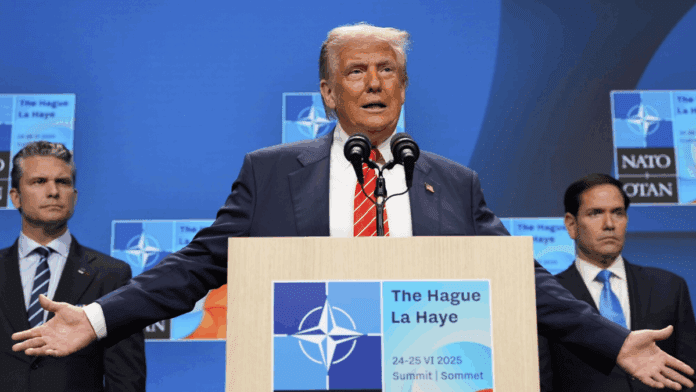At a heated NATO summit held in The Hague, U.S. President Donald Trump sharply criticized Spain for refusing to commit to a new defense spending goal. NATO countries recently agreed to raise their defense budgets to 5% of their GDP. But Spain stood apart, refusing to sign the agreement.
“You’re the only country that is not paying. I don’t know what the problem is,” Trump said when asked about Spain’s decision. He added that Spain’s refusal could come with serious consequences. “We’ll make it up. We’re negotiating with Spain on a trade deal. We’re going to make them pay twice as much. And I’m actually serious about that,” Trump warned.
This strong reaction from the U.S. President drew attention worldwide and added pressure to an already tense summit.
Tariff Threats Over Defense Budget Refusal
President Trump didn’t stop with words. He directly threatened to raise tariffs on Spain, saying it would be part of an upcoming trade negotiation. “I’m going to negotiate directly with Spain. I’m going to do it myself,” Trump declared. “They’re going to pay, they’ll pay more money this way.”
However, Spain is part of the European Union, a political and economic group of 27 countries that negotiates trade deals together. Under EU rules, individual member countries like Spain cannot strike separate trade agreements with outside countries like the U.S. The European Commission handles those negotiations.
Despite that, Trump said he was determined to move forward with a direct deal with Spain, breaking with the traditional process. The European Union and the U.S. are currently working to reach a broader trade deal by a July 9 deadline to avoid new tariffs. Trump’s comments have now placed added pressure on those talks.
Spain’s Stand Creates Friction Among Allies
The new NATO plan divides the 5% GDP target into two parts: 3.5% for core defense and 1.5% for other related areas like cybersecurity and technology. While other member countries supported the proposal, Spain declined to participate.
Spanish Prime Minister Pedro Sanchez instead secured an exemption. This allows Spain to decide its own approach to reaching NATO targets for troops and weapons. The move frustrated several allies, including the U.S., who believe shared commitments are vital for NATO’s strength.
Some NATO members voiced concerns that Spain’s refusal could hurt progress at the summit. Trump and his advisors criticized Sanchez’s decision, saying it weakened the unity of the alliance. Still, Spain held its ground, citing national budget limits and other internal concerns.
Trump’s pushback, combined with his threat of higher tariffs, has made Spain a central focus of both NATO and trade talks. His message was clear: countries that don’t meet their defense commitments may face economic consequences.


